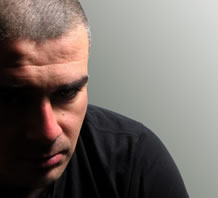What Is A Panic Attack?
Understanding what a panic attack is and how panic attacks work is an essential first step in achieving successful, permanent recovery. On this page we will explain specifically how panic attacks manifest, where they come from, why they happen and clarify why suffering with panic attacks is actually a sign of 'correct functionality' as opposed to illness. Essentially, we'll explain why although panic attacks feel awful - they are actually a healthy necessity under certain circumstances. You'll learn that once you address those circumstances, your panic attacks will automatically stop.
If you've already done your research and are ready to recover, you can look at our Panic Attack Treatment page or contact us direct on 01782 855585, 11am to 9pm, seven days a week. We can answer your questions and advise you of your options.
What Is A Panic Attack? - An Overview

For many people suffering a panic attack for the first time - it can be considered to be one of the most terrifying experiences of their life. Although panic attack symptoms can vary from person to person (and even from panic attack to panic attack) there is often considerable commonality within sufferers. For further information specifically on the signs and symptoms of panic attacks you should read our pages on:
Signs Of A Panic Attack and Symptoms Of A Panic Attack
As experiencing a panic attack is such a traumatic event, many people assume that they are seriously ill, broken or somehow faulty. Whilst it is understandable that some people may liken a panic attack to having a heart-attack or 'almost dying' - it is a long way from the truth.
In reality a panic attack is a perfectly natural, safe and calculated response by your brain to a given set of circumstances. We have been working with panic attack sufferers at our Anxiety Clinic for over seventeen years and to date we have yet to find a single person where their panic attacks were not only appropriate but also 'saving them' from harm. Thus, whilst we acknowledge panic attacks are extremely unpleasant to experience - they are actually there for a very valid reason and occur purely to keep you safe. In the next section we'll explain specifically why panic attacks are appropriate and how they protect you.
Panic Attacks - The Misunderstood Protectors

Stress, worry and anxiety are common in many peoples lives. However, generally speaking we deal with things in a way that maintains an acceptable and non-harmful level of pressure in our system. Essentially, things we perceived at one point to be stressful either get sorted out, addressed or are sometimes even forgotten about as time passes.
However, for some people under certain circumstances the internal pressure of stress, worry and anxiety doesn't remain regulated - it increases steadily over time. This doesn't mean that there has to be an immediate and noticeable event which causes anxiety levels to shoot through the roof. It is in fact far more common for a drip, drip effect to very slowly and almost imperceptibly push anxiety levels through the safe level and into the danger zone. For more detailed information on how this process works, have a look at our page on What Causes Panic Attacks
If you've read the page on 'What Causes Panic Attacks' you'll already have a working knowledge of the process. However, if you haven't that's no problem, we're sure you can relate to high anxiety levels and how they can get out of hand.
The brain is programmed to protect itself at all costs. An example of this could be summed up as you not being able to asphyxiate yourself by holding your breath voluntarily. You can choose to hold your breath for a while and you can even put up with chest discomfort as your lungs run out of oxygen. However, no matter how much will-power you have, at some point your brain will sense its safety is threatened and you will take a deep breath in. Essentially control is taken out of your hands and breathing is re-established by the subconscious part of your brain. Well the same part of your brain also regulates your stress, anxiety and emotional levels... and it can also take over from you when it feels there is 'adequate threat' to its safety.

Let's say for arguments sake that Fred has been struggling with anxiety since he was made redundant six months ago. He's had difficulty in finding suitable job vacancies, worried about how he'd be taken at interviews, struggled with money and paying his mortgage no thanks to his unhelpful bank and as a result has become more and more anxious over time. In truth Fred is playing with fire without realising it. Through his ongoing stress he has already moved out of what his brain considers to be a safe and acceptable level of 'anxiety'. In truth he has ventured perilously close to what we at the Anxiety Clinic would call reaching 'critical mass' or 'baiting a panic attack' without actually realising it. As Fred has been suffering with excessive stress and anxiety for so long it has started to become normalised for him. Basically, although to some degree he feels bad both emotionally and physically - the depth to which he has sunk has become distorted because it has happened so gradually over time.
Thus Fred is currently very close to crossing the line set by the subconscious part of his brain where the delicate neural pathways become threatened by overload and damage. The brain is pre-programmed to prevent this damage from occurring so keeps a close watch on Fred's ongoing stress and anxiety levels. If an event occurs in Fred's life, like another job refusal, where Fred starts stressing that "he'll never find work at this rate" - then this will push him over the line. Once this happens the brain starts to prepare a 'purge' of stored emotional baggage. Basically, the baggage has to be vented and dumped to protect the delicate neural pathways from overload and permanent damage.
However, this isn't to say that the panic attack will take place immediately. It can work that way - but it is uncommon. What is far more common is that the 'venting process' is started at that point, but the actual physical dumping of the emotional baggage (which manifests physically as a panic attack) may not happen for hours or even days. This is why panic attacks are unpredictable and sufferers often make huge mistakes in blaming a specific set of circumstances for causing one. So for example, if Fred has a panic attack in the Longton branch of Tesco - he may well assume the panic attack was somehow CAUSED by the Longton branch of Tesco. The knock-on effect is for Fred to avoid that particular branch of Tesco in order to avoid future panic attacks. Of course Tesco had nothing to do with the panic attack in reality, so not only is Fred pointlessly trying to avoid it as a destination - he is also beginning to structure his life around 'avoiding panic attacks'. This will be discussed in the next section.
Avoiding Panic Attacks - A Game You Can Only Lose...

We mentioned an example in the above section where Fred suffered a panic attack in the Longton branch of Tesco. His first response (as with most people) is to link the cause of the panic attack with the location or situation he was in at the time.
This process sets up a strategy of panic attack avoidance. Essentially Fred feels that if he goes to the Longton Branch of Tesco, he'll suffer another panic attack. He doesn't want that to happen so he rationalises that if he avoids the Longton branch of Tesco in the future, he will also avoid a subsequent panic attack based upon the mind set that one caused the other.
As you've already learned, panic attacks simply don't work that way. A panic attack is the venting of HUGE amounts of pent up anxiety and emotion - not just the one thing that caused the line to be crossed. Admittedly it only takes something very minor to push someone over the panic attack threshold... but it is all the other stuff it has been built upon that is pivotal in the panic attack occurring.
One of the main problems panic attack sufferers create for themselves (yes you did read that correctly) is to start living their lives in a way, that in their mind, actively avoids having another panic attack.
Fred had a panic attack in the Longton Branch of Tesco and decided there's something about Tesco that 'triggered' the panic attack. This isn't actually true - but it's what Fred believes. Thus Fred stops shopping at Longton Tesco so that he (in theory) can avoid another panic attack. However, as Fred is still stressing relentlessly about not being able to find work and his mortgage repayments he soon finds his anxiety level crosses the 'critical mass' line for a second time. His brain arranges the purge, but the actual physical venting (the panic attack) takes place later whilst Fred is driving on a dual-carriageway. Following panic attack number two, Fred uses his old rationalisation again and comes to the conclusion that dual-carriageways and possibly even driving a car will now bring on a panic attack.

Do you see how quickly a panic attack sufferers world can shrink down by using this avoidance strategy? Now Fred can't go to Longton Tesco, nor can he go on dual-carriageways and he'll also think twice about driving his car. So how stressed will Fred get when he's offered a job interview he has to drive to, potentially on a dual-catrriageway? The more he stresses, the more he gets panic attacks. The more panic attacks he suffers the more restrictions he places upon what he can and can't do. The more he restricts the more pressure he is put under. The more pressure he is put under the more he stresses... and the cycle continues...
Thus you can see from Fred's example how panic attack sufferers, through fear and avoidance can actually create more problems than they solve. This is a real travesty based upon ignorance as, in truth, once you've had a panic attack your brain has basically given you a clean sheet. All the old bad stuff has been purged and vented. However, what does your typical panic attack sufferer do with their clean sheet? - They start to worry, stress and feel anxious about having another panic attack!!!
Thus, for the most part, panic attack sufferers become 'locked in' to the panic attack cycle through their own thought processes. We're not for a moment suggesting that anyone would choose this voluntarily nor are we saying that people are doing anything less than the best they can with what they have. However, what we are saying is that if you're suffering from panic attacks you are not ill, broken or faulty and it is quite possible that to date you have been you own worst enemy.
Now, lets turn this around and make it into a positive. If you were ill, broken or faulty then you would have had a problem - but as that's not the case there is no real issue. You're almost certainly an otherwise healthy, functional human being responding as you are designed to do to excessive stress and anxiety levels. The other positive is that much of your panic attack problem has been self-inflicted by the way you deal with things in your head and hence emotionally. In truth, with the right specialist help and proven resources, changing the way you think is a very fast and straightforward process. It just takes your commitment to do something about it.
How To Recover From The Panic Attack Cycle...

There are two options open to people locked into the panic attack cycle. The first option is to do stay where they are and live with the panic attacks. As their world shrinks and the panic attacks get stronger and more numerous they may try to rationalise things out, read books, buy miracle CD's from the internet, research coping tips on forums, take medication or even queue for NHS cognitive behavioural therapy. Unfortunately the likelihood of any of these paths leading to a full permanent recovery from panic attacks are slim to nil.
This leaves option two - taking action to get the right proven help from the best specialists in the field. We know what we're talking about and we get the results our clients want.
The choice is entirely your own, as are the benefits or consequences which come with your decision. We are not here to give you a sales pitch. We just give you the factual information as to how panic attacks work and what needs to be done to fully recover. Frankly, it doesn't matter to us if you are just window shopping and leave the website without making contact or even seriously considering your recovery. Our appointment slots get filled by people who are committed to saying 'enough is enough' and taking action to help themselves. If you are one of those people, want to stop living in fear and have your life back - choose from the options below:
I'm committed to helping myself and would like more information on Panic Attack Treatment
I would like more information on a Risk Free Face To Face Consultation at the Anxiety Clinic (Staffordshire)
I can't travel to The Anxiety Clinic in Staffordshire - A Risk Free Telephone / Online Consultation would be better for me.
If you'd prefer to speak to a Consultant or ask any questions, you can call us on 01782 855585, 11am to 9pm, seven days a week. We look forward to hearing from you.




